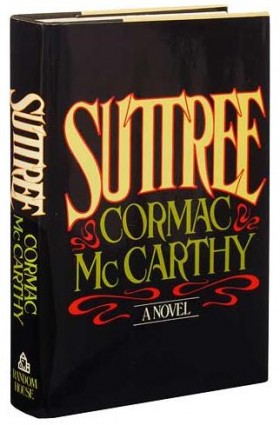
Far From Heaven – Cormac McCarthy’s Tragicomic ‘Suttree’
Commentary, Literature
Cormac McCarthy spent several decades writing “Suttree” and it shows. The sentences sing. In prose that sometimes evokes the dark imagery of Old Testament scripture, the author tells the story of Cornelius Suttree, who has given up a life of privilege and abandoned his wife and son to live among the colorful characters squatting along the polluted banks of the Tennessee River, near Knoxville, in the early 1950s. “Suttree” is one of McCarthy’s longer novels, and arguably the funniest. Funny isn’t a word typically associated with McCarthy, author of such knee-slappers as “The Road”, “Outer Dark” and “Blood Meridian”. McCarthy’s stories tend to portray one or two basically moral characters trying to survive in a world seething with menace, their violent plots fueled not by a love of life, but by an obsession with the certainty of death.
But Suttree’s hopeless neighbors are funny, and it’s a welcome departure for readers familiar with McCarthy’s work. Suttree plays the straight man to a colorful cast of drunks, criminals, witches, transvestites, goat herders, fortune-tellers, scam-artists and delinquents, people subsisting at the very fringes of society. The characters here rely on a homespun brand of black humor to cope with their dire circumstances along the dying Tennessee River, where the homeless frequently freeze to death in the cold winter months, or fall prey to the ravages of alcoholism or violence or poverty or racism.
In particular there is Gene Harrogate, whom Suttree meets in the workhouse after the boy is imprisoned for sexually assaulting a field of watermelons (the guards call Harrogate “the moonlight melon mounter”). Harrogate is a deviant, unfit for society. But Suttree quickly strikes up a friendship with this misfit, becoming a sort of father figure to the boy because “he’d never heard the city rat tell anything but the naked truth.” Camping in a warren of caves beneath the viaduct downriver from Suttree’s houseboat, Harrogate draws Suttee into several comic get-rich-quick schemes, one hilarious scene involving a slingshot, strychnine, and hundreds of dead bats.
The sparse banter between Suttree and Harrogate provides comic relief to the darker indulgences of the author and his mind-bending style. McCarthy writes English as if it were German, fusing words together to generate some wholly new noun or verb or adjective: “bullbats” are “bandywinged”, “stainedglass” is “particolored”, “shorelight” is “sundabbled”, and “teethfillings” are “toothblack”. McCarthy relies on language that evokes the power of myth, Latinate words and elaborate, complicated sentences that can’t help but curl themselves into the gloomier regions of the heart. When Suttree isn’t making us laugh, he is contemplating the afterlife, his many sins and failings and limitations. The effect is of a soul fallen from grace, of someone who remembers what it must have been like to be a happy, moral, responsible person … but whose pride or addiction or depression now prevents him from climbing out of the Hell his life has become.
At times, reading “Suttree”, you’re reminded of Mark Twain and his elegies for life on the river. McCarthy’s novel is a sobering mirror to Twain’s more optimistic vision. These characters, like Twain’s, are stoic and curious individualists. Before settling into boring, cookie-cutter lives they want to experience adventure, become one with nature, live life to its fullest. But where Twain explored the vibrant life on the river, McCarthy delves into the subterranean depths beneath it, sending Harrogate on a fool’s errand in the sewer tunnels under Knoxville in search of riches. “He had not known how hollow the city was,” writes McCarthy, before Harrogate nearly meets his end in a river of sewage.
Here is Suttree and an old, fatherly ragpicker, discussing life and death on the river:
I went down this river in the fall of ought one with a carnival dont ast me why. I followed it two year. I seen street preachers come off the circuit in the early summer and bark and shill with the best of em and go back to preachin in the fall. We went to Tallahassee Florida. They was a bunch of loggers come off the river at Chattanooga with us went into town and got drunk we had to wait the train on em. They’d done chained the locomotive to the rails with logchains. We never left out of there till five in the mornin. Had two boxcars loaded with old carny gear. We seen a feller hung in Rome Georgia stood up there on the back of a springwagon and told em all to go to hell he never done it. They drove that wagon out from under him he turned black in the face as a nigger.
Suttree smiled. Is that where you learned ventriloquism?
Where’s that?
In the carnival.
No.
I see, said Suttree.
I seen strange things in my time. I seen that cyclome come through here where it went down in the river it dipped it dry you could see the mud and stones in the bottom of it naked and the fishes layin there. It picked up folks’ houses and set em down again in places where they’d never meant to live. They was mail addressed to Knoxville fell in the streets of Ringgold Georgia. I’ve seen all I want to see and I know all I want to know. I just look forward to death.
He might hear you, Suttree said.
I wisht he would, said the ragpicker. He glared out across the river with his redrimmed eyes at the town where dusk was setting in. As if death might be hiding in that quarter.
No one wants to die.
Shit, said the ragpicker. Here’s one that’s sick of livin.
Would you give all you own?
The ragman eyed him suspiciously but he did not smile. It wont be long, he said. An old man’s days are hours.
And what happens then?
When?
After you’re dead.
Dont nothin happen. You’re dead.
You told me once you believed in God.
The old man waved his hand. Maybe, he said. I got no reason to think he believes in me. Oh I’d like to see him for a minute if I could.
What would you say to him?
Well, I think I’d just tell him. I’d say: Wait a minute. Wait just one minute before you start in on me. Before you say anything, there’s just one thing I’d like to know. And he’ll say:
What’s that? And then I’m goin to ast him: What did you have me in that crapgame down there for anyway? I couldnt put any part of it together.
Suttree smiled. What do you think he’ll say?
The ragpicker spat and wiped his mouth. I dont believe he can answer it, he said. I dont believe there is a answer.
Suttree moves with a steady, concentrated gaze through the dying world around him. It’s a world where the simple act of perception – which is so often taken for granted in this age of technological distractions – becomes, in and of itself, a heroic undertaking. A place where every leaf and twig and shadow is imbibed with double meaning, with portents of things to come:
He crossed in the twilight a pitchgreen wood grown murk with ferns, with rank and steaming plants. An owl flew, bow winged and soundless. He came upon the bones of a horse, the polished ribcradle standing among the ferns pale and greenly phosphorescent and the wedgeshaped skull grinning in the grass. In these silent sunless galleries he’d come to feel that another went before him and each glade he entered seemed just quit by a figure who’d been sitting there and risen and gone on. Some doublegoer, some othersuttree eluded him in these woods and he feared that should that figure fail to rise and steal away and were he therefore to come to himself in this obscure wood he’d be neither mended nor made whole but rather set mindless to dodder drooling with his ghosty clone from sun to sun across a hostile hemisphere forever.
The tension driving “Suttree” is the disconnect between the title character’s kind-hearted and intelligent personality and the dumb fate he has somehow embraced. “I was drunk,” is Suttree’s defense whenever confronted with the stupidity of his past actions. Early on in the story, McCarthy describes what must be the most painful hangover in the history of literature. But the reader doesn’t buy Suttree’s halfhearted excuses, and fortunately for us McCarthy gives us a glimmer of hope near the novel’s conclusion, as Suttree decides to leave Knoxville and travel out into the wider world, take responsibility for his future and grow, finally, into a man.
Having a mind and then allowing it to rot seems to be McCarthy’s definition of the abyss. Fortunately for us, this author is still bending his own exceptional mind to the task of writing one infernal, well-spun tale after the next.























[…] review was originally published at Zouch Magazine) This review is one in a series for what I’m calling the The DIY MFA in Creative […]